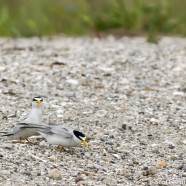Snowy Egret Saved
There is no doubt that the Migratory Bird Treaty Act saved the Snowy Egret (Egretta thula) from extinction. Beautiful plumes of feathers from these gorgeous birds were so desired that they were hunted to the brink of annihilation. What other birds will be so threatened if the Migratory Bird Treaty Act is so weakened? RTPI protects the Snowy Egret and all other long-legged waders through the Audubon Alliance for Coastal Waterbirds. Please spread the word and get many people to sign this via the American Bird Conservancy to help protect the MBTA! support.abcbirds.org/ProtectMBTA...
Read MoreLeast Terns
Here is one of those birds that would have been extirpated if not for the Migratory Bird Treaty Act – the Least Tern (Sternula antillarum). One of the focal species of the Audubon Alliance for Coastal Waterbirds, Least Terns were a target of the millinery (hat-making) trade and market hunting nearly wiped them out. Besides such a direct threat these birds must also be legally protected from harm via unaware beachgoers and unfortunately the select few who still wish to ignorantly hurt them in some way if we want them to make it through the 21st century. These photos show courtship in...
Read MoreMigratory Bird Treaty Act Under Fire
Please take a minute to fill out this petition through the American Bird Conservancy to uphold the Migratory Bird Treaty Act. If it was not for the MBTA we would not be able to enjoy many of the birds that we see around us every day. For example, the Audubon Alliance for Coastal Waterbirds may have been moot as likely all long-legged waders, terns and other shorebirds would have been extirpated. How can it be that we are trying to unravel some of the 20th century’s greatest conservation achievements, pushed forward by many people like Roger Tory Peterson, here in the 21st century?...
Read More






